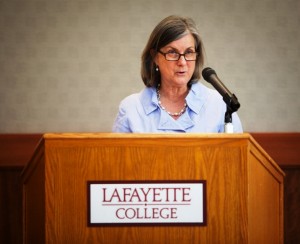By Lori H. Burke
Lafayette has launched the Center for Community Engagement to support and expand experiential learning opportunities through partnerships with communities at the local, national, and global levels.
According to Provost Wendy Hill, community-based learning teaches students how to integrate knowledge from their courses with knowledge gained from collaborating with and learning with, about, and from those in the larger community.

At the annual Community-Based Learning and Research Expo, Provost Wendy Hill announces the creation of the Center for Community Engagement and the appointment of Professor Debbie Byrd as its inaugural director.
“Lafayette is not just a place where we focus exclusively on what we learn from text. Here we also focus on knowledge that is realized and experienced in real-world situations,” she says. “We have many, many learning experiences that offer students opportunities to engage with the community. This center creates the infrastructure necessary to make these efforts much more intentional and support our faculty, staff, and students.”
The Center for Community Engagement will unite all community-based learning under one umbrella, says Hannah Stewart-Gambino, dean of the College.
“The center operates under a unified college-wide vision of experiential learning and community partnerships,” she explains. “It is focused on ensuring that student learning is central to all the experiences and that the experiences are of mutual benefit to our students and the community.”
A partnership between the academic and campus life divisions, the center allows students to become more easily connected with the full spectrum of opportunities available at Lafayette.
“Students enter that spectrum in different ways. Some might enter it through a course and then seek more opportunities through the Landis Community Outreach Center. Or they might enter through the Landis Center and want to take a course that incorporates community-based learning,” Stewart-Gambino explains. “The beauty of bringing it all together is the recognition that learning occurs across the entire spectrum. It tends to be transformational, no matter where it occurs. And this center creates a greater visibility and coordination among all of those opportunities.”
The center’s recently appointed director, Debbie Byrd, professor of English and women’s and gender studies, has been involved in community-based learning and research focused on young parents for about a decade.

Kristin Anderson ’14 and Deborah Byrd, professor of English, stand in the storage room at the Easton Area Neighborhood Center as part of a community-based research project. Byrd will take on the role of director of the College’s new Center for Community Engagement.
“Community-based learning gives students a sense of agency,” she says. “They learn that they can make a difference in the world. So, it promotes the idea that they can be involved in civic engagement for the rest of their lives. It teaches them that problems are typically quite complex and that teamwork and bringing together knowledge from various disciplines is absolutely essential. It also offers a human face to the statistics and makes all of the book learning really hit home.”
Bonnie Winfield, director of the Landis Center since 2006, has been named director of community partnerships. In her previous role, Winfield worked with Amber Zuber, Landis Center associate director, to foster College-community partnerships that contribute to the well-being of communities locally and globally. Winfield—a member of the Easton City Planning Commission—teaches a community-based course in which students interact with incarcerated women.
Winfield holds a Ph.D. in peace studies from Syracuse University. In her new role, she will continue her efforts to build mutually beneficial partnerships in the community.
“Community-based learning is about reciprocity, and it’s intentional,” she says. “People are doing great work. Through the new center, the College will come together to look at best practices, consider our effects on the community, and measure that effect. I think this is a step that can lead to something really amazing that will highlight and enhance all the work that we’re doing.”
Byrd and Winfield will be located in the center’s new office at 522 March St., adjacent to the Residences at March Street, a student residence hall.
A steering committee of students, faculty, staff, and community members is at work shaping the direction of the center and developing an infrastructure to create and sustain momentum. They also expect to connect with alumni to draw on their experiences and seek opportunities for partnership.

